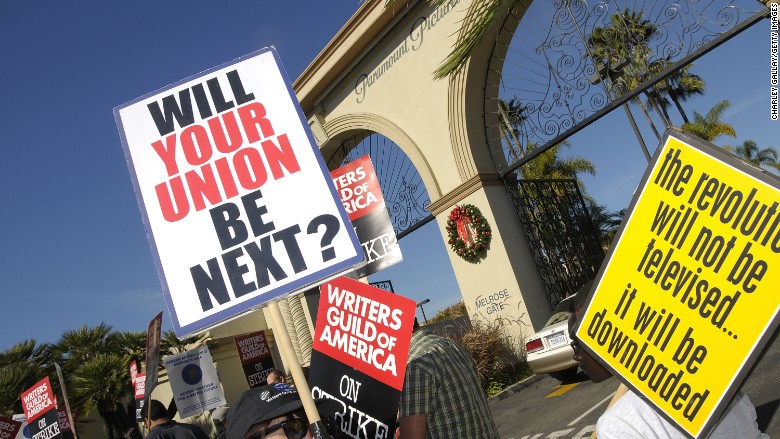
The Writers Guild of America will give peace another chance next week as Hollywood waits to find out if an industry-rattling strike is imminent.
The Guild will resume talks with the Alliance of Motion Picture and Television Producers (AMPTP) the week of April 10, the organization announced Monday night in a letter to its roughly 20,000 members.
The decision comes a few days after AMPTP sent a letter to Guild heads David Young and Lowell Peterson asking them to return to the negotiation table.
Before that letter, talks had stalled when the Guild's sole response to a new proposed contract drafted by AMPTP was a strike authorization vote, AMPTP said.
Related: Why Hollywood's writers might be headed for a strike
AMPTP is a trade association that represents over 350 production companies and studios.
Over the weekend, the WGA released a slew of data intended to support its case for higher pay for TV writers and more help sustaining its healthcare plan.
The WGA argues that television writers are not being fairly compensated for their work as studios flourish from the benefits of Peak TV, a term used by industry insiders to describe the abundance of high-quality television.
The Guild also says that extended production models have resulted in writers getting paid the same amount of money to do more work and they can't make up the difference due to the decreased in episode orders across the industry.
"As a result, writer-producers at all levels of experience have seen their compensation for a year of working on a series drop, at the median, between 8% and 26%," the Guild said in its data. "After earning a half a season's salary at minimum, writers can find themselves both losing health coverage and unable to pay the bills."
Studios, in turn, argue that their business model and profits are also threatened by the changes hitting the industry.
Hollywood waits
The effects of the writers strike of 2007 are still fresh in the minds of many in Hollywood.
That strike lasted 100 days and carried a billion dollar price tag for California alone, according to some estimates.
Not only were productions halted, but businesses that rely on servicing the entertainment industry also felt the bite of the strike.
"'Worth it' is impossible to judge on almost any strike, that one was no exception," one showrunner writer-director who's been a member of the Guild since 1970 told CNN Money.
The current contract expires May 1.
If a new deal is not reached by then, writers rooms would shutter and likely disrupt the 2017 fall TV season.
"Homeland" executive producer Alex Gansa is hoping a deal is made.
The writers will begin work on Season 7 of the acclaimed Showtime hit in two weeks, and a strike would "throw a completely huge wrench in the works for us," he told CNN Monday at an Emmy season kick-off event held for his show.
"I'm really hoping it doesn't happen," Gansa said. "We're just hoping everybody reasonably comes to terms and doesn't throw the entire industry into a spiral."
"Homeland" executive producer and scribe Chip Johannessen is one of the co-chairs on the WGA negotiating committee.
For now, the WGA plans to move forward with its strike authorization vote, scheduled to take place April 19-24.
-- CNN Money's Brian Lowry contributed to this report.





